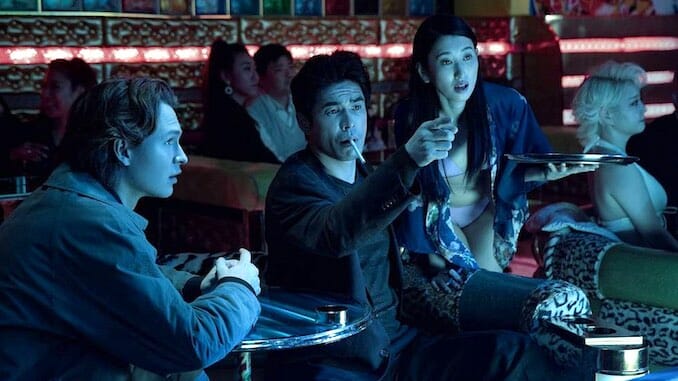HBO Max’s Tokyo Vice Is Unique, a Little Strange, and Ultimately Rewarding
Photo Courtesy of HBO Max
Let’s give praise, first and foremost, for a television show that knows its place. By that, I don’t mean it in the colloquial sense, as in “understands its limited role and sacrifices ambition for workmanlike success.” I mean it literally: a show that knows its place. In the case of Tokyo Vice, the new crime series from HBO Max, they had the courage to put the actual place in the title, which sets a high bar. And it’s a bar they clear, easily; Tokyo is front and center, and in the episodes made available to critics—the first of which is directed by Michael Mann—the drama co-exists with a celebration of all things Tokyo, from the big, bright karaoke bars to the dimly lit side alleys. To know your place, as a writer and director, is to love your place, and though I’ve never been to Tokyo, I’ve also never encountered any work of art that makes me want to go so badly. We’ll talk about many characters in the paragraphs to come, but Tokyo is the biggest, boldest character of them all, and it comes off complex, mysterious, alluring, and indomitable.
The other half of the title, the “vice” part, is almost as good. Jake Adelstein (Ansel Elgort) is an aspiring journalist in late ‘90s Tokyo, an era that seems almost quaint for the way it was positioned just before the explosion of the Internet age, and cell phones in particular. Adelstein is a gaijin, an American foreigner hailing from the University of Missouri, but his talent and devotion is so complete that he’s able to land a job as a crime reporter at Tokyo’s largest newspaper after nearly acing the entrance exam. This amounts to his dream job, because he’s very obsessed with figuring out how the capital city truly works, and very, very obsessed with the Yakuza, the blanket term denoting the Japanese mafia. He barely talks to his family, his only friends work at the newspaper, he has no girlfriend, and all that remains is a samurai-like devotion to his passion. (Adelstein is a real person, of course, the author of the book of the same name, but the dramatization here is sufficient to dispense with any notion that this is a biopic.)
Elgort is up to the task of playing Adelstein, and does so with a sense of humor that makes him less of an absolute weirdo than he could be. The show starts with a meeting between him and a leader of the Tozawa crime organization, who threatens him with all manner of violence if he doesn’t stop work on a damaging story on the group’s de facto patriarch. From there, the writers send us backward in time, before Adelstein worked for the paper, to show us how things got so serious. There is a hyper-focus on Adelstein at the start, alone in Tokyo, but slowly his world expands.
The word “slowly” is key. There is superficially fast pacing to the show, in terms of the lights and sounds and crowds that define this version of Tokyo, but the story itself moves at a slow pace and requires patience. By the third episode, we have only really begun to dig into the lives of characters like Samantha (Rachel Keller), another ex-pat who works as a hostess—but not a prostitute, she insists—for high-end clients visiting her bar and restaurant, or Detective Hiroto Katagiri (Ken Watanabe), who feels stifled by the police department’s reluctance to investigate organized crime, and finds an unlikely ally in Jake, or Sato (Show Kasamatsu), a Yakuza member who is every bit as violent as he needs to be for the job—but also possibly a little too smart, a little too ambivalent. There are editors and friends and criminals that come to orbit these four, but they represent the heart of the action. All of them are very good, and Watanabe and Kasamatsu in particular are captivating actors who never leave a scene anything but better for having been in it.